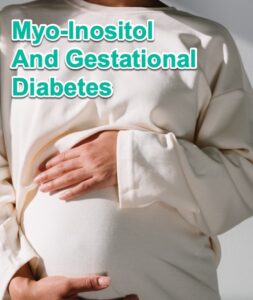
MyoInositol and Gestational Diabetes
Gestational diabetes is diagnosed when a woman’s blood sugar levels are elevated during pregnancy, without her having a previous history of diabetes. Elevated blood sugar in pregnancy can increase the risk of serious complications including preterm birth, high blood pressure, and pre-eclampsia. Additionally, it can increase the risks of having a very large baby, leading to the increased possibility of a c-section. As a result, identifying whether you’re at risk of gestational diabetes and working to prevent it through diet, movement, and supplementation (if indicated) is incredibly important if you’re trying to conceive! Myoinositol—a supplement most known for its use in PCOS—has a growing body of research supporting its use in gestational diabetes prevention and treatment.
Who is at risk of gestational diabetes?
Women who are at higher risk for gestational diabetes include those who are overweight, women with PCOS, those with a family history of diabetes, those who have had a baby over 8lbs 13 ounces in the past, and women who are over 40 years old. If you fall into any of these categories and are trying to conceive, working to prevent gestational diabetes and the need for insulin medication is an important health goal.
Gestational diabetes prevention
It’s important to get regular exercise and follow a well-balanced diet both before and during pregnancy.
Mediterranean-style diets have been found to reduce the risk of gestational diabetes and its complications1. This type of diet includes lots of healthy fats such as olive oil and nuts and seeds. It also emphasizes an abundance of assorted colourful vegetables, and increased fish protein. Additionally, this diet avoids saturated fats, processed foods and refined grains.
Alongside a Mediterranean-style diet, it’s important to continue to be active before and during pregnancy, as this also reduces the risk of gestational diabetes2. Research has found that moderate aerobic exercise done 3 days a week for 50-55 minutes can significantly reduce excessive weight gain in pregnancy and rates of gestational diabetes compared to those who don’t exercise2.
Myoinositol supplementation
Another consideration when working on preventing and treating gestational diabetes is myoinositol. Supplementing with it is an evidence-based treatment option that may reduce the risk of gestational diabetes. It can also reduce the need for insulin medication, and can reduce the negative birth outcomes listed above3,4,5!
Myoinositol is known for its insulin-sensitizing effects and has been studied extensively for its positive impacts on insulin resistance in women with PCOS. It’s found naturally in foods such as fruit, beans, and grains, and humans can synthesize myoinositol themselves3.
A study done with 220 pregnant women found that supplementing with myoinositol led to a significant reduction in the gestational diabetes rate, as well as insulin resistance levels compared to the women who took a placebo3.
Additional research has found that supplementation with myoinositol led to less insulin medication being prescribed, more women delivering at later gestational age, and significantly smaller babies than in those who were not on myoinositol4. Additionally, babies born to women who were treated with it had fewer incidents of neonatal hypoglycemia. This is low blood sugar in a baby in the first day or two after birth4.
What’s just as important as its use as an effective treatment option, research to date finds that myoinositol is a safe option. No significant adverse events were noted with the use of myoinositol in research completed to date5.
Next steps
If you’re trying to conceive or are currently pregnant, and are at increased risk of gestational diabetes, start working on prevention now! Get tested, and work with a practitioner who can guide you through dietary, movement and safe supplementation recommendations. Remember to never start on a supplement without being under the care and supervision of a healthcare practitioner.
References
- Assaf-Balut, C., García de la Torre, N., Durán, A., Fuentes, M., Bordiú, E., del Valle, L., Familiar, C., Ortolá, A., Jiménez, I., Herraiz, M., Izquierdo, N., Perez, N., Torrejon, M., Ortega, M., Illana, F., Runkle, I., de Miguel, M., Montañez, C., Barabash, A., Cuesta, M., Rubio, M. and Calle-Pascual, A., 2017. A Mediterranean diet with additional extra virgin olive oil and pistachios reduces the incidence of gestational diabetes mellitus (GDM): A randomized controlled trial: The St. Carlos GDM prevention study. PLOS ONE, [online] 12(10), p.e0185873. Available at: <https://pubmed.ncbi.nlm.nih.gov/29049303/>.
- Barakat, R., Refoyo, I., Coteron, J. and Franco, E., 2019. Exercise during pregnancy has a preventative effect on excessive maternal weight gain and gestational diabetes. A randomized controlled trial. Brazilian Journal of Physical Therapy, [online] 23(2), pp.148-155. Available at: <https://pubmed.ncbi.nlm.nih.gov/30470666/>.
- D’Anna, R., Di Benedetto, A., Scilipoti, A., Santamaria, A., Interdonato, M., Petrella, E., Neri, I., Pintaudi, B., Corrado, F. and Facchinetti, F., 2015. Myo-inositol Supplementation for Prevention of Gestational Diabetes in Obese Pregnant Women. Obstetrics & Gynecology, [online] 126(2), pp.310-315. Available at: <https://journals.lww.com/greenjournal/Fulltext/2015/08000/Myo_inositol_Supplementation_for_Prevention_of.14.aspx>.
- Matarrelli, B., Vitacolonna, E., D’angelo, M., Pavone, G., Mattei, P., Liberati, M. and Celentano, C., 2013. Effect of dietary myo-inositol supplementation in pregnancy on the incidence of maternal gestational diabetes mellitus and fetal outcomes: a randomized controlled trial. The Journal of Maternal-Fetal & Neonatal Medicine, [online] 26(10), pp.967-972. Available at: <https://www.tandfonline.com/doi/full/10.3109/14767058.2013.766691>.
- Sobota-Grzeszyk, A., Kuźmicki, M. and Szamatowicz, J., 2019. Myoinositol in the Prevention of Gestational Diabetes Mellitus: Is It Sensible?. Journal of Diabetes Research, [online] 2019, pp.1-5. Available at: <https://www.ncbi.nlm.nih.gov/pmc/articles/PMC6925787/>.




